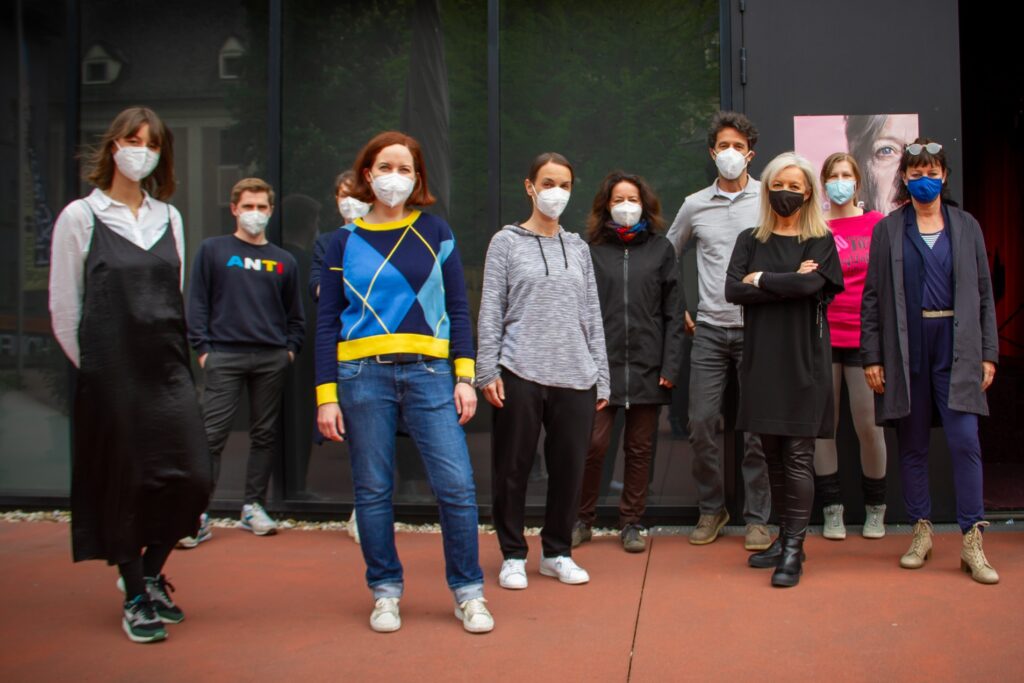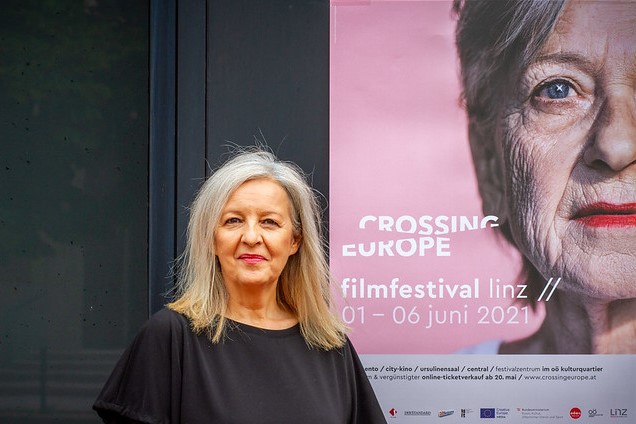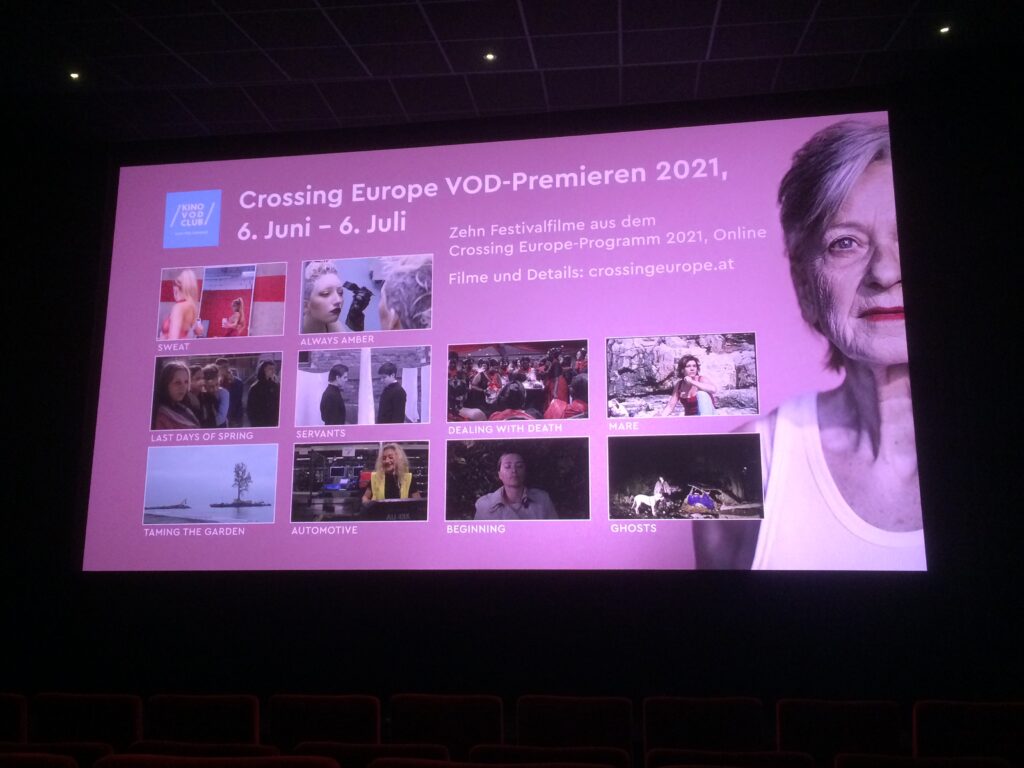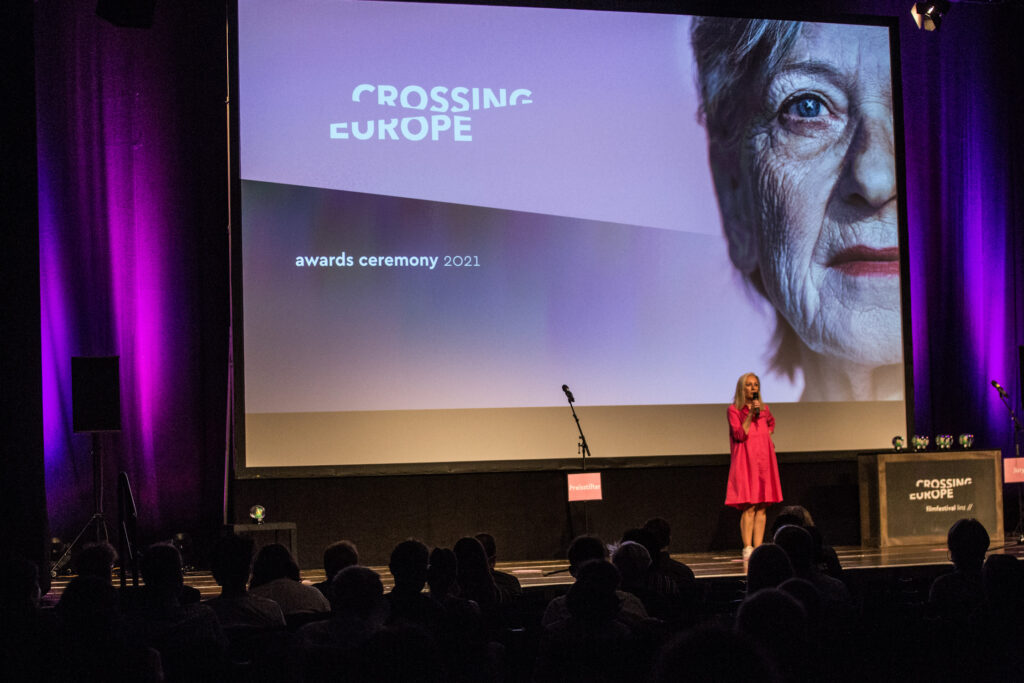for film lovers as for filmmakers: A conversation with Christine Dollhofer on the 18th edition of Crossing Europe in June 2021
Interview by Tanja C. Krainhöfer, translation by Geraldine Blecker

“Festivals at last!“ was also the slogan of Crossing Europe (June 1 – 6), and for many friends of cinema far beyond the festival community, together with the Vienna International Shorts (May 27 – June 1) and the Diagonale in Graz (June 8 – 13), created the long-awaited state of emergency from the state of emergency. At screenings of 123 hand-picked feature, documentary and short film highlights from 40 different countries (including 24 world premieres and 71 from Austria), nearly 10,000 visitors joined festival director Christine Dollhofer and her team on an exciting and diverse journey through Europe. In an interview with Tanja C. Krainhöfer, she reports on the highs and lows of planning, preparing and implementing two festival editions defined by the pandemic, and offers an outlook on the irreversible developments for the entire cinema landscape.
TCK: Crossing Europe is now one of the first European film festivals to return physically after months of cinema closures due to the pandemic. How does that feel?
CD: Somehow unreal. It seems to have happened so quickly. Three months ago, it was totally uncertain if, when and how. So we prepared various scenarios for the film festival: physical, hybrid, online only. Last year we had to cancel our festival as a result of the massive Covid surge in Europe. But even during that cancellation phase, we decided to offer alternatives. The program was ready, everything had been set up, so to speak, including the catalog, which then wasn’t printed. And so we presented two thirds of the program during the year: the Crossing Europe Extracts, an online program, a Local Artists track and a VALIE EXPORT Tribute as part of the Ars Electronica Festival, then the Crossing Europe Tuesdays in the cinema until the next lockdown came. We implemented relatively more with partners all over Austria, from summer cinemas to programs at later festivals that could be held again on a limited scale, as well as collaborations in several Austrian cities. This also kept us pretty busy throughout the year. At the same time, we were preparing the next festival, always thinking ’next year this will all be over and it will be like before‘.

TCK: When did you finally have to realize that that probably was not going to be the case?
CD: That already became apparent In the winter. I was still in Venice and San Sebastian, where implementation of the restrictions with checkerboard seating and masking in the cinema had worked very well. And then the film festivals usually held early in the year, such as the International Film Festival Rotterdam and the Berlinale, were successively canceled.
TCK: In Germany, there were very different attitudes among the funding bodies at the state level when it came to supporting film festivals. Some simply recommended cancelling, others assumed the necessary additional costs. What was the position in Austria?
CD: It took a while, but then a great deal happened in Austria in terms of support for all cultural sectors and institutions. And in all fairness, I never had the feeling that I was being left alone. Nonetheless, additional costs were incurred in many cases. Due to the postponement, the team had to be employed longer, we needed more staff for all the admission controls, for Covid and ticket controls, and the online ticketing system all had to be financed. We have always had 700 to 800 professionals accredited in recent years. And although there were somewhat fewer this year due to the pandemic, that group in particular made personalized ticketing very complex. But now there is this tool, which will also be very useful for the future.
TCK: Looking back, what would you say were the biggest challenges?
CD: The uncertainty, yes. For a very long time it was unclear if and when the first openings would take place, when cinema operations would be possible again, and if so, under what conditions. In other words, how many people are allowed into a cinema venue, what needs to be considered and, above all, until what time can the programming be made. Until three weeks before the festival opened, we still had a closing time of 8 p.m. in Austria. Thereafter, everything had to close. But having to close the festival every day at 8 p.m. is terrible! Then it was extended to 10 p.m. which is also very early. So we started the first screenings at 9:30 a.m. and by 10 p.m. every film had to be over. But now that it’s summer, people were peacefully standing outside in the evening and talking. And that was very good. Everyone was very supportive, very patient. And everybody was very happy that the festival could even physically take place at all. And what’s really heartbreaking, all the guests who were there, and we did have quite a few international guests, said „This is my first screening with an audience!“ There were actually quite a few who were screening their films before an audience for the very first time, as their films had only been presented at online film festivals. So, here, the films were Austrian premieres, although they might have previously been shown at the IDFA, the International Film Festival Rotterdam, or at the online edition of Cannes, or the Berlinale, or they had just been shown at a film festival last year and then it was over – only films could travel in the digital space, not the filmmakers.
TCK: How was the scouting for the 2021 edition of Crossing Europe? And did you have the impression that there is a great number of new productions on the market?
CD: Yes, there are a lot of films on the market. There was certainly no lack of films for programming. Of course, everyone is thinking very strategically now. When is the best time to introduce a film to the public? We are not first place when it comes to festival rankings. For the bigger films, it was more a question of whether we should think along the lines of the online Berlinale, or if it would be better to wait for Cannes. We have quite a few Austrian premieres, some of which we are presenting together with the Diagonale. But I think now is a good time to go out with a film. Many productions may have already had their world premieres and are now in the portfolios of the various distributors, waiting for theatrical release. In the meantime, many films have also been completed and will now also be presented at festivals or released in theaters. I like to compare it to the traffic jam on the Suez Canal, which was completely blocked by a freighter in March. That created total disruption. And it will take at least a year for it to be resolved again.
TCK: In addition to numerous conceptual expansions last year and this year, you also expanded spatially. Was this also due to the pandemic, or were there other considerations at the forefront?
CD: We have always strived to ensure that films from the Crossing Europe program are presented at other venues in Austria, as well as in the context of other film festivals. Thus, the films of Nachtsicht are shown at SLASH 1/2, others at the Festival des neuen Heimatfilms or in the summer cinemas, in the Film Museum and Film Archive in Vienna, or Das Kino in Salzburg, as well as other cinemas and operators throughout Austria. And parts of the program are shown, especially in Vienna. And then, fortunately, it happens that films shown here are bought by an Austrian distributor. Last year, we bundled these initiatives under the label „Crossing Europe goes“ and although this year it was not clear for quite a while, but there will certainly be many re-screenings, as well as other activities.
In addition, we also planned an online edition from the outset. Because we thought it important that no matter whether the festival could take place physically or not, we could react flexibly. So we negotiated the online rights at the same time. Now, following the physical festival from June 6th to July 6th, we are doing the online Crossing Europe edition via the KINO VOD CLUB, a platform that allows one third of the ticket price to benefit the cinema. The offer is primarily intended for those who, for whatever reason, could not attend the Crossing Europe film program in situ.

TCK: The film festival landscape has shown itself to be extremely resilient in recent months. While other cultural sectors have been virtually invisible, it seems as if the film festivals have rolled up their sleeves and developed a Plan B. How do you explain this drive and high degree of flexibility?
CD: I think that has to do with two aspects in particular. First, we work in a digital medium and were therefore better prepared. In the media field, you work digitally on many levels, so it’s easier to rethink and be more nimble. We screen a lot online, so why shouldn’t we also offer films to the public online? And on the other hand – I can see this in our case, for example – we have put a lot of passion and energy into a project, and to simply cancel it would have frustrated us all. That’s why you quickly and automatically think of alternatives to make the program accessible. In addition, financing had also been provided for certain festival activities, which also had to be substantiated, so to speak. So there is also the necessity to implement an event vis-à-vis the patrons, sponsors, or cooperation partners, in order to justify the financing.
TCK: Did you perhaps see it as an opportunity to try out new ways of doing things?
CD: I think a chain reaction was set in motion very quickly. You saw a film festival launching an online program, and then you thought, we can do that, too. Role models were then found and people thought “wow“. For example, Cannes and Berlinale online, we were really perplexed by how well that was implemented. Of course, the Marché and the EFM have other financial possibilities and international relevance. And when you realize that one or the other suddenly has even more viewers than physically, you are under some pressure and want to keep up. But I think everyone should find their own form. And every festival best knows its audience and how it should be organized.
TCK: In contrast to this chain reaction among film festivals, cinemas have been largely reticent about a return to the movie theater. How do you explain that and do you still consider it contemporary?
CD: The situation now has to be rethought and changes will certainly occur. The exploitation of films is a big topic overall. What will it look like in the future, also with regard to blocking periods, television exploitation, etc.? In the meantime, it is all completely dissolving, as we are currently seeing in America and, as we know, these developments will ultimately also affect the European market. And so you can already see – which I find bitter, of course – films that were in competition in Venice in the Fall of 2020, such as „And Tomorrow the Whole World“ by Julia von Heinz, or „The Disciple“ by Chaitanya Tamhane, can already be found on streaming platforms.
But in Austria, the art house cinemas have also been operating the KINO VOD CLUB since 2017, through which you can watch a great many art house films. And there is also the VoD platform FILMMIT, with a large Austrian focus. In the beginning, KINO VOD CLUB ran a bit under the radar, but the pandemic has accelerated its growth enormously. We as a film festival were very satisfied last year with our extracts on VoD, but of course geo-blocked and with screening limits per film.
TCK: And how do you assess the need for digital auditoriums for commercial cinema operations?
CD: Commercial cinemas earn money from ticket sales, as well as from concessions and gastronomy. And ticket sales in the cinema are still far more lucrative than online tickets, which are cheaper and allow more viewers to participate. Added to that, the income from popcorn and Cola is lost. That’s why some cinemas are not yet open. That seems to me to be the reason. But the shift will come. If cinemas are inviting, if the equipment is good, if the culinary offer, apart from popcorn, is right, if you can perhaps even have dinner on site – to put it simply, if the overall package is right, if the cinema is a place where you like to linger before and after enjoying a film, then cinemas have a long-term perspective for the future. Provided, of course, that they can fall back on exclusive film offerings.
But successful target group work is also essential for this, as is inclusive work, through which communities are also invited to proactively shape programs and wishes are also fulfilled. I think it will involve a lot more work for cinema operators to retain their audience, attract new audiences and to serve those audiences. Along with that, cinemas will also need more financial resources, comparable to theaters and concert halls. Multiplexes will go their own way, certainly offering even more technical innovations, even more spectacular screening conditions, event cinema experience, so to speak. But as far as cinephilia is concerned, i.e. the art house cinemas, the curatorship, the ambience, the target group work, as well as the mediation work are central. And a major challenge will be how to win over Generation Y for this form of reception, for cinema and for the cultural practice of watching films together.

This interview was first published in German in the trade magazine Kinema Kommunal, issue June 2021.
